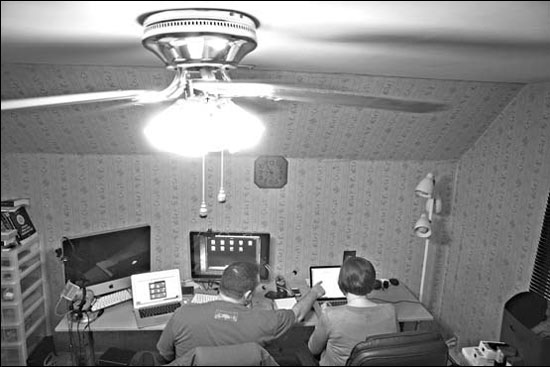App writers find riches are elusive
Updated: 2012-11-25 07:57
By David Streitfeld(The New York Times)
|
|||||||||
|
Shawn and Stephanie Grimes had limited success writing software. They now work in their spare time out of an attic bedroom in a relative's house. Daniel Rosenbaum for The New York Times |
ROSEDALE, Maryland - Shawn and Stephanie Grimes spent much of the last two years pursuing their dream of doing research and development for Apple, the world's most successful corporation.
But they did not actually have jobs at Apple. It was freelance work that came without a regular income, health insurance or retirement plan. The Grimeses prepared by throwing overboard everything they could. They sold a car and rented out their six-bedroom house. They even cashed in Mr. Grimes's retirement account. "I'll retire when I die," said Mr. Grimes, 32.
The couple's chosen field is so new it did not even exist a few years ago: writing software applications for mobile devices like the iPhone or iPad. Even as unemployment in the United States remained stubbornly high and the economy struggled to emerge from the recession's shadow, the ranks of computer software engineers, including app writers, increased nearly 8 percent in 2010 to more than a million, according to the latest available government data for that category. These software engineers now outnumber farmers and have almost caught up with lawyers.
Much as the Web set off the dot-com boom 15 years ago, apps have inspired a new class of entrepreneurs. These innovators have turned cellphones and tablets into tools for discovering, organizing and controlling the world, spawning a multibillion-dollar industry virtually overnight. The iPhone and iPad have about 700,000 apps, from Instagram to Angry Birds.
Yet with the American economy yielding few good opportunities, there is debate about how real, and lasting, the rise in app employment might be.
Despite the rumors of hordes of hip programmers starting million-dollar businesses from their kitchen tables, only a small minority actually make a living by creating their own apps, according to surveys and experts. The Grimeses began their venture with high hopes, but their apps, most of them for toddlers, did not come quickly enough or sell fast enough. The Grimeses' efforts cost $200,000 in lost income and savings and their apps earned less than $5,000 so far this year.
And programming is not a skill that just anyone can learn. While people already employed in tech jobs have added app writing to their resumes, the profession offers few options to most unemployed, underemployed and discouraged workers.
One success story is Ethan Nicholas, who earned more than $1 million in 2009 after writing a game for the iPhone. But he says the app writing world has experienced tectonic shifts since then.
|
An app made by the medical software company echoBase. Beatrice De Gea for The New York Times |
"Can someone drop everything and start writing apps? Sure," said Mr. Nicholas, 34, who quit his job to write apps after iShoot, an artillery game, became a sensation. "Can they start writing good apps? Not often, no. I got lucky with iShoot, because back then a decent app could still be successful. But competition is fierce nowadays, and decent isn't good enough." Mr. Nicholas is now involved in a start-up, echoBase, that designed an app allowing doctors and nurses to view and update medical records. Revenue is now coming in, but the company is a long way from making a profit.
The boom in apps comes as economists are debating the changing nature of work, which technology is reshaping. The upheaval began its latest turbulent phase with the migration of tech manufacturing to places like China. Now service and even white-collar jobs are disappearing.
"Technology is always destroying jobs and always creating jobs, but in recent years the destruction has been happening faster than the creation," said Erik Brynjolfsson, director of the M.I.T. Center for Digital Business.
Still, the digital transition is creating enormous wealth and opportunity. Four of the most valuable American companies - Apple, Google, Microsoft and I.B.M. - are rooted in technology. And it was Apple, more than any other company, that set off the app revolution with the iPhone and iPad. Since Apple unleashed the world's freelance coders to build applications four years ago, it has paid them more than $6.5 billion in royalties.
A study commissioned by the tech advocacy group TechNet found that the "app economy" - including Apple, Facebook, Google's Android and other app platforms - was responsible, directly and indirectly, for 466,000 jobs. Apple said this month that its app business had generated 291,250 jobs for the American economy. That number rose 39 percent in less than a year. During that time, the number of United States developers paying the $99 annual fee to register with Apple rose 10 percent to 275,000. Some of these registered developers have other full-time jobs and write apps in their spare time.
Michael Mandel, the economist who conducted the TechNet study, said it was problematic to slice the jobs data as Apple had done. "The guy who writes an Apple app one day will write an Android app the next day," he said. "You can't add up all the numbers from every study to get the total number of jobs."
Apple keeps 30 percent of each app sale. While its job creation report trumpets the $6.5 billion the company has paid out in royalties, it does not note that as much as half of that money goes to developers outside the United States. The pie is smaller than it seems.
"My guess is that very few developers make a living off their own apps," said Jeff Scott, who runs the Apple app review site 148Apps.com and closely tracks developments in the field.
But with hundreds of new apps introduced every day in Apple's store, the field is overcrowded.
On one level, it was a strange move for Apple to open its devices to people like the Grimeses. Imagine a violinist's horror at letting a toddler play with his Stradivarius and you would have some idea of Apple's reluctance to let anyone outside of its walls fool with its technology. Apple's chief executive, Steven P. Jobs, agreed to unlock the gates of the fledgling iPhone only after much internal argument, and he made sure that Apple would retain strict oversight of every app. It might have been the smartest decision ever made by a company that prides itself on creating the future.
The App Store opened in July 2008 with 500 apps. In an interview, Mr. Jobs laid bare the company's goal: "Sell more iPhones." And so, thanks in large part to the multitude of apps, it came to pass. More iPhones - nearly seven million - were sold in the next three months than in the entire previous year.
Apple's financial documents show just how crucial app inventors are. If the developers stop developing, the company warned last month, "customers may choose not to buy the company's products." So far, there has not been much risk of revolt.
Developers have expressed flickers of grumpiness at Apple's 30 percent cut of each app sale. A shadowy group calling itself the App Developer Union briefly posted a petition online this summer asking for "something more equitable." The union disappeared from the Web as mysteriously as it had arrived. Mr. Nicholas has the same philosophy about Apple now as he did when he wrote iShoot. "I'd rather get 70 percent of a large pie than all of a small pie," he said.
The New York Times
(China Daily 11/25/2012 page10)

